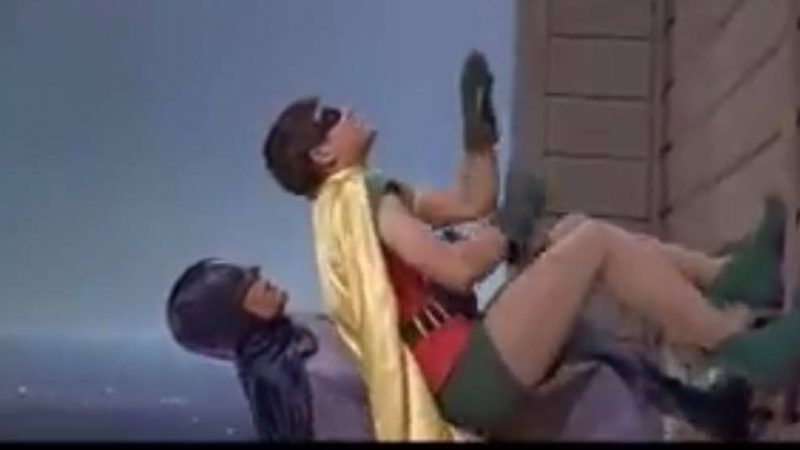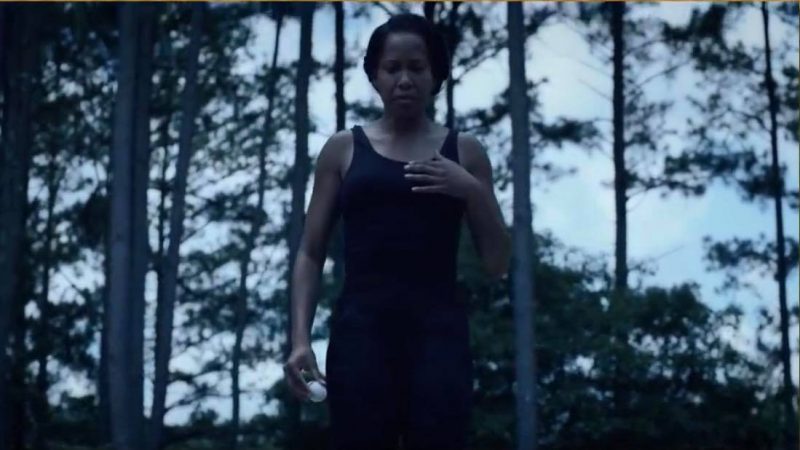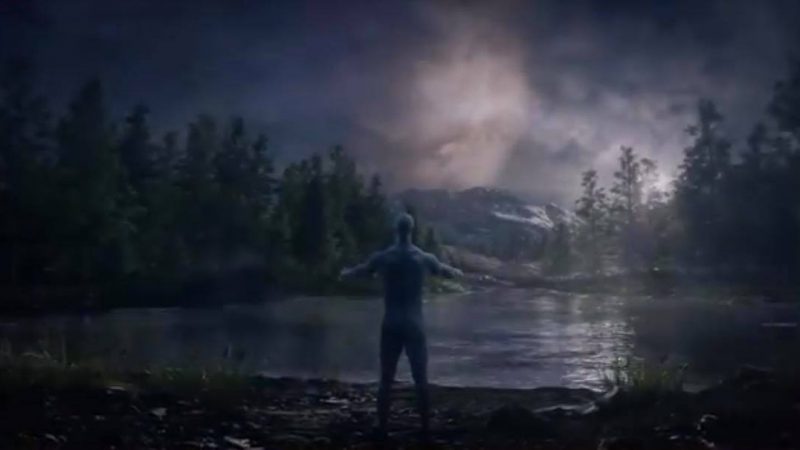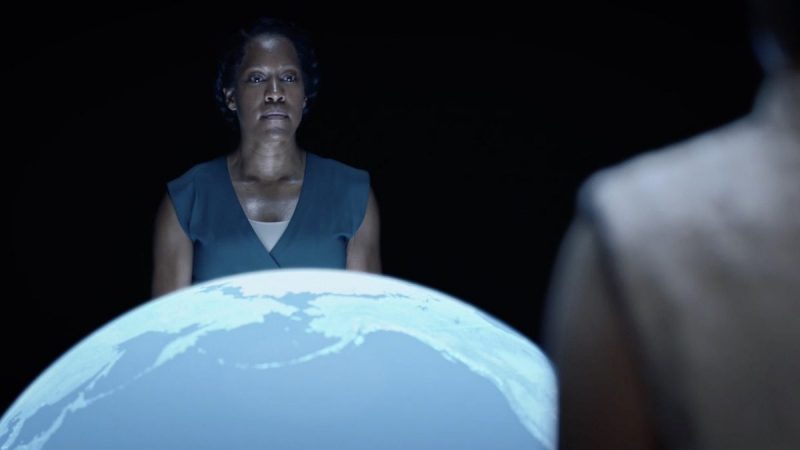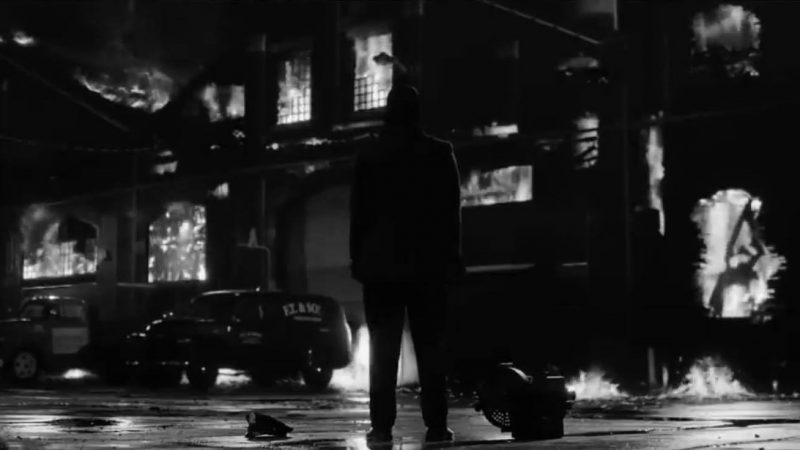We Watch the Watchmen: Season 1 Episode 2, ‘Martial Feats of Comanche Horsemanship’
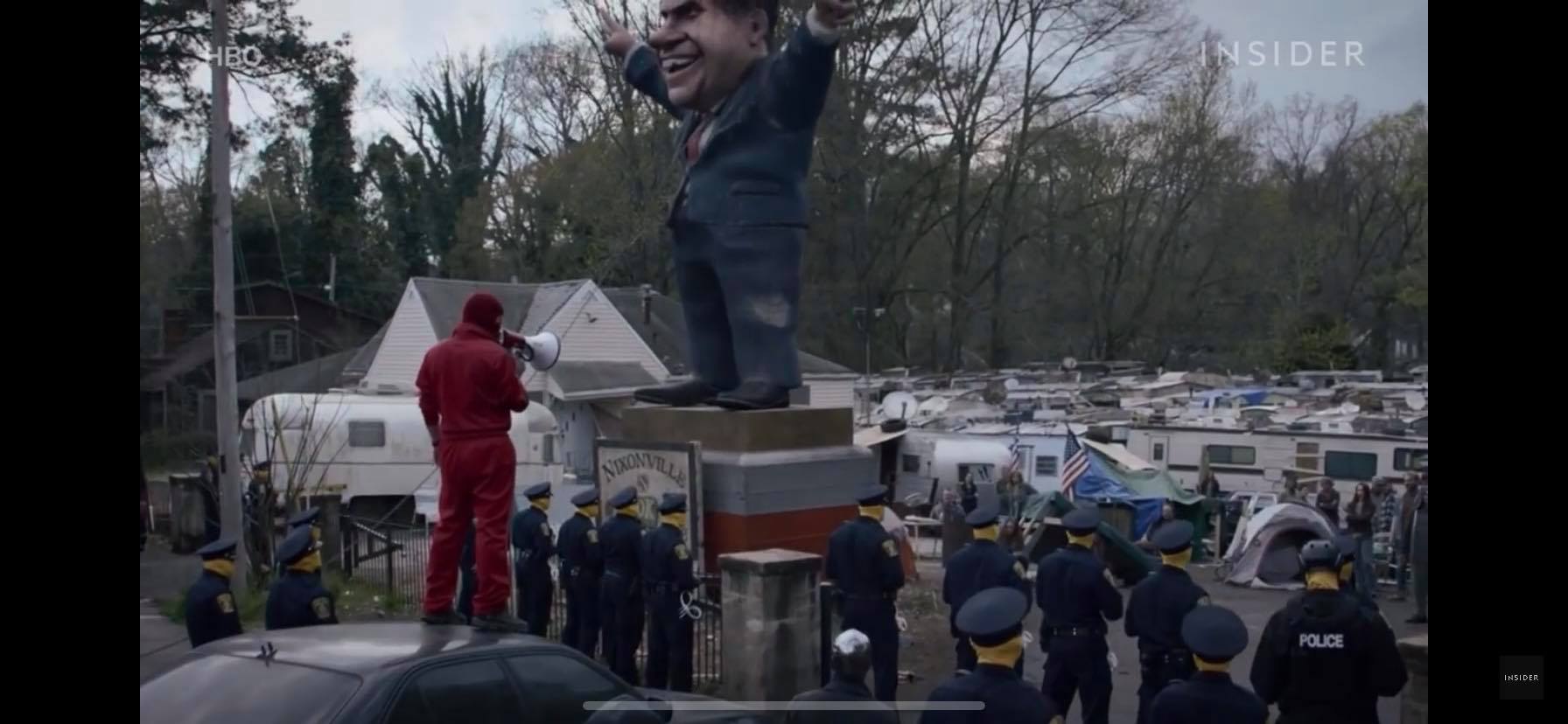
We may not have been pleased with last week’s premiere of the new HBO show Watchmen, but we will give this week’s episode, “Martial Feats of Comanche Horsemanship,” credit for being a mixed bag. It might even show some promise. Let’s get recappin’.
The episode opens on a room full of women typists in a World War I-era office. A German commandant calls in an English-speaking typist and dictates a piece of propaganda: a letter to Black American soldiers, detailing rights they are denied at home but that Black German citizens have. We see these flyers being air-dropped, and a soldier catching one: the father of the boy who escaped the Tulsa massacre at the beginning of last episode. We see the boy himself trying on his father’s uniform jacket, finding the paper, and the father taking the paper away. Then we see the boy, now the man in the wheelchair of present day, holding the same paper, and written on the back of it, the message “WATCH OVER THIS BOY.” From the man’s perspective, we see Angela (our protagonist) approach the tree where, at the end of last episode, she found the lynched body of the police chief. We see Angela wheel the man toward her car without a word, then drive him to the bakery where she hides her vigilante costume (you will recall that she has a nun-themed getup and goes by Sister Night). She cuffs the man to a table, suits up, and returns, offering him a coffee. He drinks it. She asks him who he is, and he only responds to that question by saying, “I’m the one who strung up your chief of police.” Though she doesn’t believe that he did it, she asks “why,” and he says the chief had “skeletons in his closet,” adding that there is a “vast and insidious conspiracy at play.” Aside from that, all he will say is that his name is Will. When the police department pages her, Angela leaves Will handcuffed in the bakery, but takes the mug he drank from, sealing it in an evidence bag.
Here we see a transitional scene: a news vendor in a pageboy cap, reminiscent of the iconic news vendor in Alan Moore’s graphic novel; this vendor is ranting to a delivery man about how the squidfall (remember the rain of squid last episode?) is a government “false flag.” The conversation ends when a little girl in glasses and a beret stops to buy a stack of newspapers. If the show is patterned anything like the comic it’s based on–and it very much looks like it will be–these minor characters will be ones to watch.
When Angela arrives at the scene in costume (having pretended to the other police that this is the first she’s heard of the murder), she parks her car and Looking Glass gets in. You’ll recall from last episode–if you caught any of the lightning-fast mentions of character names–that Looking Glass is the guy with the reflective Rorschach-style mask (covering his whole head), and that we don’t know his real name. Looking Glass asks if there are any snacks, Angela points him to the glove compartment, and Looking Glass pulls his mask half-up and munches on the nuts he finds there. For fans of the graphic novel, this is a striking scene, because it mirrors a recurring motif involving Rorschach. That character had a habit of pulling his mask half-up and munching on snacks (often sugar cubes) stolen from his friends; put this moment together with the visual, last episode, of Looking Glass’ mask reflecting Rorschach blots during the interrogation scene, and we have a worrying parallel. The parallel is further drawn when Angela asks Looking Glass if the police chief suffered, and Looking Glass replies, “yup,” then gives her an excruciatingly detailed list of his injuries, all from apparent torture. Rorschach, too, was frank and tactless about violence.
Their conversation is interrupted when someone in mechanical wings lands on the hood of the car, falls to the ground, and is revealed to be holding a camera. Another masked officer–who, you would only know if you’ve obsessively read promotional materials like we have, is called Red Scare–destroys the camera with extreme prejudice as another winged spy is shot down.
Angela suggests they get the chief’s body down from the tree, and while they’re doing so, she has a flashback. It’s Christmas Eve, at midnight, and she’s dancing with her husband, alone in their living room, when they hear a noise. It’s an intruder in the house, soon revealed to be a rifle-wielding man in a Rorschach mask. Angela and her husband are separated, and Angela hides in the kitchen, where she is able to take down the intruder with a knife–only for another to appear and shoot her. She wakes up in the hospital, three days later, and the police chief–whose name, we finally gather, is Jud–is at her bedside. He tells her that her husband is fine, but that Seventh Cavalry terrorists attacked forty homes in a coordinated effort. Jud’s arm is in a sling, and Angela’s partner on the force is dead. We learn that the dead partner had three children, and that Angela and her husband adopted them–leading, as we have already seen, to a fair bit of scorn from those around them, given that the children are white and racial tensions are high. Aside from Angela and Jud, the surviving police officers have resigned from the force en masse, for their own and their families’ safety. Only Angela and Jud will remain, though of course we learned last episode that Angela pretended to retire in order to protect her family.
The flashback ends, Jud’s body bag is closed, and Red Scare suggests they go to Nixonville (a trailer park/shantytown inhabited by poor white people, presided over by a statue of Nixon) to “beat the shit” out of the denizens until someone gives up the murderer. Angela advises that they wait, but is overruled. The police force blockades Nixonville, and Red Scare orders all the inhabitants to get in their paddy wagons, under threat of the destruction of the Nixon statue. One resident throws something at a police car, and the police attack. Angela refuses to participate, but when one resident attacks her, she fights back with alarming aggression. Seeing that she has knocked the man out, she wisely decides to remove herself from the situation. Getting in her car, she is reminded of the evidence bag with the mug Will drank from.
We next see Angela outside the “Greenwood Center for Cultural Heritage,” a building that is picketed by a handful of white protesters. Inside is a museum where visitors interact with holograms that educate them on Black history. Angela approaches a machine, where a video of Henry Louis Gates, Jr. — in this universe, Secretary of the Treasury — explains the 1921 massacre, and notes that its victims and their descendants are eligible for reparations. Angela swabs the mug and places a DNA sample in the machine for testing, giving her phone number so she can receive the results.
Returning home, Angela finds a white man on the porch, and their conversation quickly makes clear that he is a relative of Angela’s adopted children and has visitation rights. She pays the man off to reschedule the visit, and he makes a disparaging comment about her benefitting from “Redfordations.” Inside, Angela debriefs with her husband, then goes upstairs to see her oldest son, Topher, who is building a city with a futuristic toy in his room. She tells him Jud is dead, and he handles the news calmly, volunteering to be the one to tell his younger sisters — then smashes the city he was building and asks if he can watch TV. So yeah, it’s a whole family of traumatized people.
The show Topher wants to watch is American Hero Story: MInutemen, which tells the tale of the nation’s first vigilantes. The show is preceded by a long message that combines the typical ratings warnings — violence, nudity, and such — with trigger warnings for such content as misogyny, racism, anti-semitism, and sexual assault. It’s unclear what the show is trying to do with this — are we supposed to be scoffing at “p.c. culture” or dreaming of a world where meaningful trigger warnings are easily available? Given the tone of the scene, we’re guessing the former was intended. At any rate, the show is narrated by Hooded Justice, the first American vigilante, whose identity the graphic novel never confirms, but who is implied to be a circus strongman that was assassinated in the 1940s (probably by the Comedian, a vigilante in the employ of the government). The narration claims that this was not the character’s true identity. Then the show flashes back to a bank robbery, which Hooded Justice interrupts, beating up the thieves in a stylized, surreal fight that is a clear homage to the Zack Snyder movie. Hooded Justice then monologues to the cashier about his own psychology (the showrunners clearly don’t think much of American Crime Story, and they want us to know it). The monologue plays as a voiceover as we see Angela drive up to Jud’s house, where his wife Jane is holding his wake.
It’s an awkward scene. Angela walks into the house to find herself completely surrounded by white people, none of whom she seems to know. Jane greets her warmly, as does the man she’s speaking with, a senator called Joe King. He offers her all resources at his disposal to catch Jud’s murderers, and Angela nervously reminds him that she is “retired” from the police force. The awkward conversation is cut off when Angela apparently faints. She wakes up in the bedroom, where Jane is handing her a glass of water. When Jane steps away, leaving her to recuperate, Angela gets up, quickly donning a pair of high-tech goggles that allow her to see through solid objects. She explores the walk-in closet, and sees a mannequin of some sort behind Jud’s tie rack. When she opens the secret door there, she is shocked to find a KKK robe. She walks out of the house hurriedly.
Cut to Adrien Veidt’s estate, where we see the man riding his horse, just as we did last episode. He goes inside, and is given a birthday cake in a scene that remains eerily similar. It is soon revealed that Veidt’s butler and maid are actually androids, and that he has been having them rehearse a play — The Watchmaker’s Son, as mentioned, again, in the last episode. The androids are enacting Dr. Manhattan’s origin story: a physicist is fixing a watch for his girlfriend, leaves the watch in a particle accelerator, goes to retrieve it, gets locked in, and gets blown up inside the accelerator. He then returns as Dr. Manhattan, a detached, blue-skinned superhuman (in the play, the return is set to “Ride of the Valkyries,” another nod to the movie, which in itself was a nonsensical nod to an unrelated moment in the graphic novel). The actors and crew — a whole set of eerily similar androids — help with the cleanup, including the disposal of the corpse of the butler-android, whom Veidt really incinerated in the prop particle accelerator. It’s a disturbing scene, and it offers a few key insights for viewers who might not be familiar with the show’s source material: that Veidt is intelligent, that he has little regard for life and seeks little companionship, and that he is obsessed with understanding Dr. Manhattan. Of course, since only those familiar with the graphic novel will recognize the character as Veidt at all, we’re still waiting to see where this thread is going.
We return to Angela, who returns to the bakery, only to find Will free of his handcuffs and calmly waiting for her. She tells him she searched for “skeletons in the closet,” and throws the KKK robe at Will, asking if he tried to frame Jud. Will claims he “didn’t mean it literally” and seems surprised to find the robe. He asks if she’s going to arrest him, and she says she won’t; he says he would have been rescued anyway, as he has “friends in high places.” Just then, the phone rings: it’s the DNA test results. Angela discovers not only that Will survived the 1921 massacre, but also that she is his granddaughter. “Your parents didn’t tell you anything about me?” he asks her. They didn’t. Will says he is there to meet her and show her where she came from, and Angela, who is frustrated and has had a very bad day, decides to arrest him after all. She lifts him out of his wheelchair (you may recall that, last episode, he asked if she could lift two hundred pounds) and into her car; the moment he is settled in the car, a hovercraft appears overhead and drops a giant magnet, which it uses to haul the car — and therefore Will — away. The paper — the propaganda flyer with “WATCH OVER THIS BOY” written on the back — falls into Angela’s hands. Her reply is an extremely relatable, “what the fuck?”
What, indeed, the fuck. This episode has given us some great moments — I’ll admit to gasping aloud when the chief’s KKK robe was revealed — but the show is clearly still in its warm-up stage. It could get really good from here, as hinted at by the complexity of the main plot and the number of artfully laid threads it contains. Then again, it could end up a mess, like the Adrien Veidt scenes. Next week, we look forward to finding out if there’s something to look forward to.


